Medigen Vaccine Biologics Corp’s (高端疫苗) board of directors yesterday approved a proposal to conduct a phase 3 clinical trial of its COVID-19 vaccine in Europe, it said yesterday.
The final stage of human tests, if approved by the European Medicines Agency (EMA), would mark a big milestone in the COVID-19 vaccine development of Medigen, which has so far completed phase 1 and 2 clinical trials in Taiwan and is conducting a small phase 3 clinical trial in Paraguay.
Medigen in July consulted the EMA about conducting clinicial trials of its vaccine and it received a “positive response” from the agency, the company said in a statement.

Photo: Bloomberg
The EMA advised the company to conduct a phase 3 clinical trial directly in Europe instead of phase 1 or phase 2 trials, as the European regulator took into account that Medigen had completed earlier-stage human tests of the vaccine in Taiwan, company spokesman Leo Lee (李思賢) told by telephone.
The company is to finalize its design for the protocols of the phase 3 clinical trial in the near term and would apply to the EMA for permission to go ahead with it.
Although Medigen had researched how a third shot would bolster immunity by giving tens of participants in Taiwan a third dose, the company would still give two doses to those enrolled in its phase 3 trial in Europe, Lee said.
The number of participants in the clinical trial in Europe is expected to be 4,000 or fewer, and the trial would be conducted in multiple locations in multiple countries in Europe, it said.
“If everything goes smoothly, the clinical trial would begin in November and yield preliminary results in the first quarter next year,” Lee said.
It is possible that Medigen would be able to conduct an immunobridging study to compare the levels of antibodies in people who have received a Medigen vaccine against those who have been given one of the vaccines approved in Europe, the company said.
So far, the EMA has approved four COVID-19 vaccines for use in Europe: Pfizer-BioNTech, Moderna, AstraZeneca and Johnson & Johnson; the first two are developed by the messenger RNA technology while the latter two are adenovirus-based vaccines, the EMA’s Web site showed.
Medigen’s vaccine is a protein-subunit vaccine, developed by the recombinant technology; the vaccine comprises recombinant spike protein of SARS-CoV-2 as the antigen to help a person’s body recognize the real virus if the person becomes infected, company data showed.

NEW IDENTITY: Known for its software, India has expanded into hardware, with its semiconductor industry growing from US$38bn in 2023 to US$45bn to US$50bn India on Saturday inaugurated its first semiconductor assembly and test facility, a milestone in the government’s push to reduce dependence on foreign chipmakers and stake a claim in a sector dominated by China. Indian Prime Minister Narendra Modi opened US firm Micron Technology Inc’s semiconductor assembly, test and packaging unit in his home state of Gujarat, hailing the “dawn of a new era” for India’s technology ambitions. “When young Indians look back in the future, they will see this decade as the turning point in our tech future,” Modi told the event, which was broadcast on his YouTube channel. The plant would convert

‘SEISMIC SHIFT’: The researcher forecast there would be about 1.1 billion mobile shipments this year, down from 1.26 billion the prior year and erasing years of gains The global smartphone market is expected to contract 12.9 percent this year due to the unprecedented memorychip shortage, marking “a crisis like no other,” researcher International Data Corp (IDC) said. The new forecast, a dramatic revision down from earlier estimates, gives the latest accounting of the ongoing memory crunch that is affecting every corner of the electronics industry. The demand for advanced memory to power artificial intelligence (AI) tasks has drained global supply until well into next year and jeopardizes the business model of many smartphone makers. IDC forecast about 1.1 billion mobile shipments this year, down from 1.26 billion the prior

People stand in a Pokemon store in Tokyo on Thursday. One of the world highest-grossing franchises is celebrated its 30th anniversary yesterday.

Zimbabwe’s ban on raw lithium exports is forcing Chinese miners to rethink their strategy, speeding up plans to process the metal locally instead of shipping it to China’s vast rechargeable battery industry. The country is Africa’s largest lithium producer and has one of the world’s largest reserves, according to the US Geological Survey (USGS). Zimbabwe already banned the export of lithium ore in 2022 and last year announced it would halt exports of lithium concentrates from January next year. However, on Wednesday it imposed the ban with immediate effect, leaving unclear what the lithium mining sector would do in the